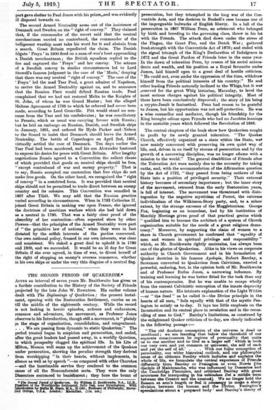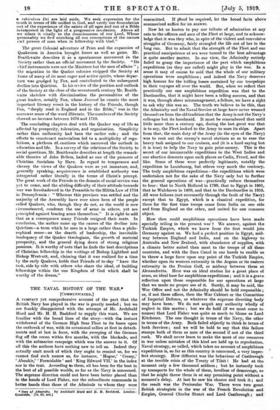THE SECOND PERIOD OF QUAKERISM.*
Arne an interval of seven years Mr. Braithwaite has given us a further contribution to the History of the Society of Friends projected by the late John W. Rowntree. His earlier volume dealt with The Beginnings of Quakerism; the present instalment, opening with the Restoration Settlement, carries us on till the middle of the eighteenth century. While the record is not lacking in heroic episodes, ardours and endurances, romance and adventure, the movement, as Professor Jones observes in his Introduction, though still a movement, is" plainly in the stage of organization, consolidation, and congealment. . . . We are passing from dynamic to static Quakerism." The period treated began in suspicion and persecution, and ended, after the great leaders had passed away, in a worldly Quietism, in which prosperity clogged the spiritual life. In his Lite of Milton, Masson well sums up the achievement of the Quakers under persecution, showing the peculiar strength they derived from worshipping "in their hearts, without implements, in silence as well as by speech "—as compared with other Churches —and the inestimable service they rendered to the common cause of all the Nonconformist sects. They were the only Dissenters sentenced to banishment ; they bore the brunt of
persecution, but they triumphed in the long war of the Conventicle Acts, and the decision in Bushell's ease became one of the impregnable bulwarks of English liberty. In a lull of the persecution in 1667 William Penn, an aristocrat who belonged by birth and breeding to the governing class, threw in his lot with the Friends. The attack died down under the stress of the Plague, the Great Fire, and the Dutch War ; gathered fresh strength with the Conventicle Act of 1670; and ended with the signal triumph of the King's Declaration of Indulgence in 1672 and the Great Pardon of Friends later in the same year. In the dawn of toleration Penn, by reason Of his social antecedents and wealth, and his position as a Royal favourite under James, laid himself open to a great deal of hostile criticism. "He could not, even under the oppression of the time, withdraw himself from the political interests of his country." He and other leading Friends naturally inclined to the Whigs, but it was reserved for the great Whig historian, Macaulay, to level the most serious charges against his political integrity. Most of these have been conclusively disproved ; the story of his being a crypto-Jeault is fantastical. Penn had reason to be grateful to James, but his opportunism was not self-protective. He was a wise counsellor and mediator, though his friendship for the King brought odium upon Friends who had no Jacobite leanings in the unstable years which followed the Revolution of 1688.
The central chapters of the book show how Quakerism sought to profit by its newly granted toleration. "The Quaker Church, effectively organized as a state within the State, was now mainly concerned with preserving its own quiet way of life, and, driven in on itself by storms of persecution and by the growth of a narrowing discipline, was no longer aflame with a mission to the world." The general disabilities of Friends after the Toleration Act were mainly due to the necessity for taking oaths, and, with the accommodation of the Affirmation question by the Act of 1722, "they passed from being outlaws of the State into a position of privileged security." Their external history becomes of secondary importance ; but the inner story of the movement, retraced from the early Restoration years, is full of interest. The movement was threatened with disintegration by the negative mysticism of Perrot, the extreme individualism of the Wilkinson-Story party, and, to a minor extent, by the strange excesses of the Muggletonians. George Fox, beginning as an iconoclast, had by his institution of Monthly Meetings given proof of that practical genius whioh "qualified him to become the architect of a system of Church organization suitable for the needs of a great religious democracy." Moreover, by supporting the claim of women to a share in Church government he confirmed that "equality of men and women in spiritual privilege and responsibility" which, as Mr. Braithwaite rightly maintains, has always been one of the glories of Quakerism. Alike in his views on corporate authority in Church Government and in his formulation of Quaker doctrine in his famous Apologia, Robert Barclay, a Scotsman converted to Quakerism from Calvinism, exerted a powerful, enduring, but, in the opinion both of Mr. Braithwaite and of Professor Rufus Jones, a narrowing influence. By training and learning he was better fitted for the task than any of his contemporaries. But he was unable to escape wholly from the current Calvinistic conception of the innate depravity of human nature. His intricate explanation of the Light Within —or "the Seed" as he called it—the Divine principle in the hearts of all men, "fails equally with that of the mystic) Penington to satisfy us to-day. It lays too little emphasis on the Incarnation and its central place in revelation and in the reconciling of man to God." Barclay's limitations, as construed by the enlightened Quaker criticism of to-day, are clearly indicated in the following passage :— "The old dualistic conoeption of the universe is dead or moribund ; we are learning that below the threshold of our separate consciousness lie regions of personality that unite us to one another and to God as a larger self whit% is both our very own and yet common or universal, the self of each and yet the self of all.' . . . With our fuller conception of personality, our wider historical outlook, and our philosophic sense of an ultimate Reality which includes rind explains the whole of life, we formulate the central experience of Friends differently from Barclay or Penington or even Norris (the disciple of Malebranche, who was influenced by Descartes and the Cambridge Ple.tonists, and criticised Barclay with great acuteness for interposing in his vehicadoni Dos a middle term between the Creator and the created). We no longer hold the Reason at arm's length or feel it neoessy to majte a sharp division between the human and the Divine. Penington speculations about a 'prepared body' and Barclay's theory of
a veltieulion Dei are laid aside. We seek expression for the truth in terms of life unified in God, and verify our formulation out of the experience of the saints of all ages and out of a Bible interpreted in the light of a progressive revelation. Above all we relate it vitally to the consciousness of our Lord, Whose personality we fled enriching all our conceptions of the nature t nd powers of man when in fellowship with God."
The great Colonial adventure of Penn and the expansion of Quakerism in America brought losses as well as gains. Mr. Braithwaite describes it as a spontaneous movement in the Society rather than an official movement by the Society. "Its chief instruments were not the Ministers but the men of affairs " ; the migration to the Quaker colonies stripped the Society at home of many of its most eager and active spirits, whose departure was grudged by Fox, and contributed to the subsequent decline into Quietism. In his review of the position and outlook of the Society at the close of the seventeenth century Mr. Braithwaite sketches with discrimination the personalities of the great leaders, notably Fox, whose Journal he counts the most important literary event in the history of the Friends, though Fox, "deeply read in England and in the Bible," was in the narrower sense of the word illiterate. The numbers of the Society showed no increase between 1670 and 1719.
The concluding chapters deal with the Quaker way of life as
affected by prosperity, toleration, and organization. Simplicity rather than uniformity had been the earlier rule ; and the efforts to counteract materialism led to a multiplicity of regulations, a plethora 6f. cautions which narrowed the outlook in education and life. In a survey of the relations of the Society to social questions, Mr. Braithwaite describes at length the remarkable theories of John Bellers, hailed as one of the pioneers of Christian Socialism by Marx. In regard to temperance and slavery the views of the Quakers were as yet immature, and, generally speaking, acquiescence in established authority was interpreted rather literally in the terms of Christ's precept. The great work of the Friends in the domain of social service was yet to come, and the abiding difficulty of their attitude towards war was foreshadowed in the Preamble to the Militia Law of 1754 in Pennsylvania : "Whereas this province was settled and the majority of the Assembly have ever since been of the people called Quakers, who, though they do not, as the world is now circumstanced, condemn the use of arms in others, yet are
principled against bearing arms themselves." It is right to add that as a consequence many Friends resigned their seats. In conclusion, the author sums up the causes of the decline into Quietism—a term which he uses in a large rather than a philosophical sense—as the dearth of leadership, the inevitable inadequacy of the Quaker theologians, the growth of material prosperity, and the genera dying down of strong religious passions. It is worthy of note that he finds the best descriptions
of Christian fellowship in the writings of Bishop Lightfoot and Bishop Westeott, and, claiming that it was realized for a time by the early Quakers, holds that Friends of to-day "have the task, side by side with others who share the ideal, of building fellowships within the one Kingdom of God which shall be worthy of the dream."















































 Previous page
Previous page